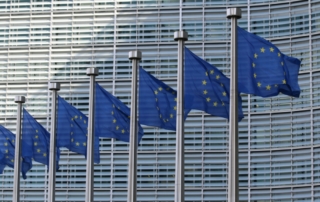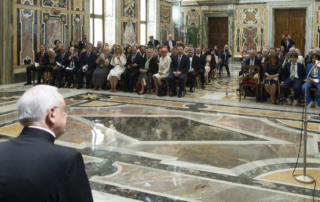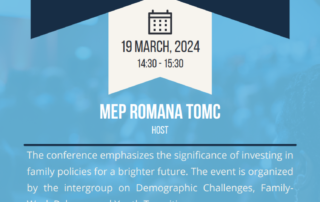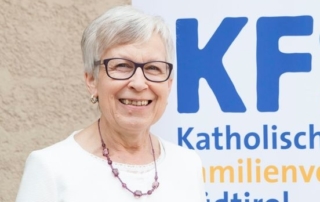European Union
Although family-policies are a national competence and greatly vary across the 27 EU Member-States, the European Union can play an important role in promoting family-friendly policies. FAFCE supports in this direction the daily work of the different EU bodies:
- European Parliament: composed of representatives directly elected by the EU citizens, it participates to produce the EU legislation with the European Council and the European Commission.
- European Council: composed of the EU heads of state or governments, it defines the EU’s political directions and priorities.
- European Commission: composed of designated Commissioners led by a President, it is responsible for proposing legislation, implementing decisions, upholding the EU treaties and managing the day-to-day business of the EU.
- Council of the European Union: composed of Ministers from each Member-States, it meets regularly to discuss specific points on the EU legislation and coordinate EU policies.
- Economic and Social European Committee: composed of representatives of civil society (workers’ and employers’ organisation, interest groups, etc.), this EU advisory body issues opinions on EU issues.
- Committee of the Regions: composed of locally and regionally elected representatives, this EU advisory body produces opinions on EU legislation that directly impact regions and cities.
FAFCE welcomes resolution to create an annual designation of European Capitals of Children
Brussels, 15th March 2024 FAFCE welcomes the resolution on the creation of a European initiative for an annual designation of European Capitals of Children. The resolution was passed by the European Parliament yesterday. The resolution highlights the following: Children's
FAFCE comment on the Inclusion of the right to abortion in the EU Charter of Fundamental Rights
Brussels, 15th March 2024 Yesterday the European Parliament debated the Inclusion of the right to abortion in the EU Charter of Fundamental Rights. This debate comes less than a week after President Macron enshrined the 'right' to abortion in
FAFCE statement on France’s constitutional inclusion of abortion
Brussels, 13th March 2024 Last week, France became the only country today to enshrine the "fundamental liberty" to an abortion. This week, President Macron announced a process to legalise euthanasia. The wording for the constitutional inclusion on abortion was
11th Anniversary of Pope Francis’ Election
Brussels, 13th March 2024 Today we celebrate the 11th anniversary of the election of Pope Francis. The first Jesuit Pope and the first from the Americas, his pontificate has been historic in form as well as substance ever since
FAFCE to co-host conference: Investing in the Family, Investing in the Future
Brussels, 12th March 2024 FAFCE will co-host a conference with Romana Tomc MEP entitled Investing in the Family, Investing in the Future in Brussels on Tuesday 19th March 2024. The conference emphasizes the significance of investing in family policies
FAFCE statement on the discussion of the Employment, Social Policy, Health and Consumer Affairs Council
Brussels, 12th March 2024 FAFCE welcomes the discussion of the Employment, Social Policy, Health and Consumer Affairs Council on 11th March. Families should be at the core of policy-making, particularly vulnerable families and large families. The Council called upon
FAFCE welcomes EU directive on platform workers
Brussels, 12th March 2024 On Monday 11th March, EU member states approved an agreement on the rights of platform workers. Considered under the status of contractor or self-employed, this directive provides a pathway towards the protections that are granted
PRESS RELEASE Irish referendum on family and motherhood: “common sense is back”
Brussels, 11th of March 2024 The people of the Republic of Ireland rejected proposed constitutional changes during two referendum votes on Friday. Family networks were crucial to the successful NoNo campaign, whereas the failed YesYes campaign was supported by
International Women’s Day 2024: Carla Di Lello
Brussels, 8th March 2024 Every 8th March the world celebrates International Women's Day. To celebrate the occasion, we have spoken to a couple of strong women around FAFCE who promote the family. Please read our feature interview with FAFCE
International Women’s Day 2024: Angelika Weichsel Mitterrutzner
Brussels, 8th March 2024 The 8th March is celebrated as International Women's Day. At FAFCE, we work with incredible women and mothers across Europe. Today we spoke to Angelika Weichsel Mitterrutzner, who serves on FAFCE's board as our Second












